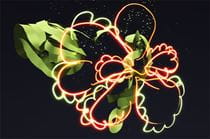Girija Kaimal, EdD

Kaimal’s research focuses on understanding the way that creative self-expression affects human emotions and other brain processes. Some of that work has involved examining how activities such as coloring, drawing or doodling affect stress hormone levels or activation of the brain’s reward pathways. Particularly, her work often focuses on understanding the ways that people’s own experiences and stories, especially related to the art they create, affects their lives and health. She also focuses on what effects self-expression can have on underrepresented or vulnerable populations.
She has undertaken multi-year studies in art therapy programs among armed service members at the National Intrepid Center of Excellence (NICoE) at Walter Reed National Military Medical Center. Kaimal is also interested in the role creativity plays in empowerment and learning and has looked into arts-based psychosocial support for vulnerable children and adults in areas of the world particularly effected by trauma.
Related from the Drexel News Blog
Contact
267.359.5507 Gk27@drexel.eduIn The News
Drexel News is produced by
University Marketing and Communications.







